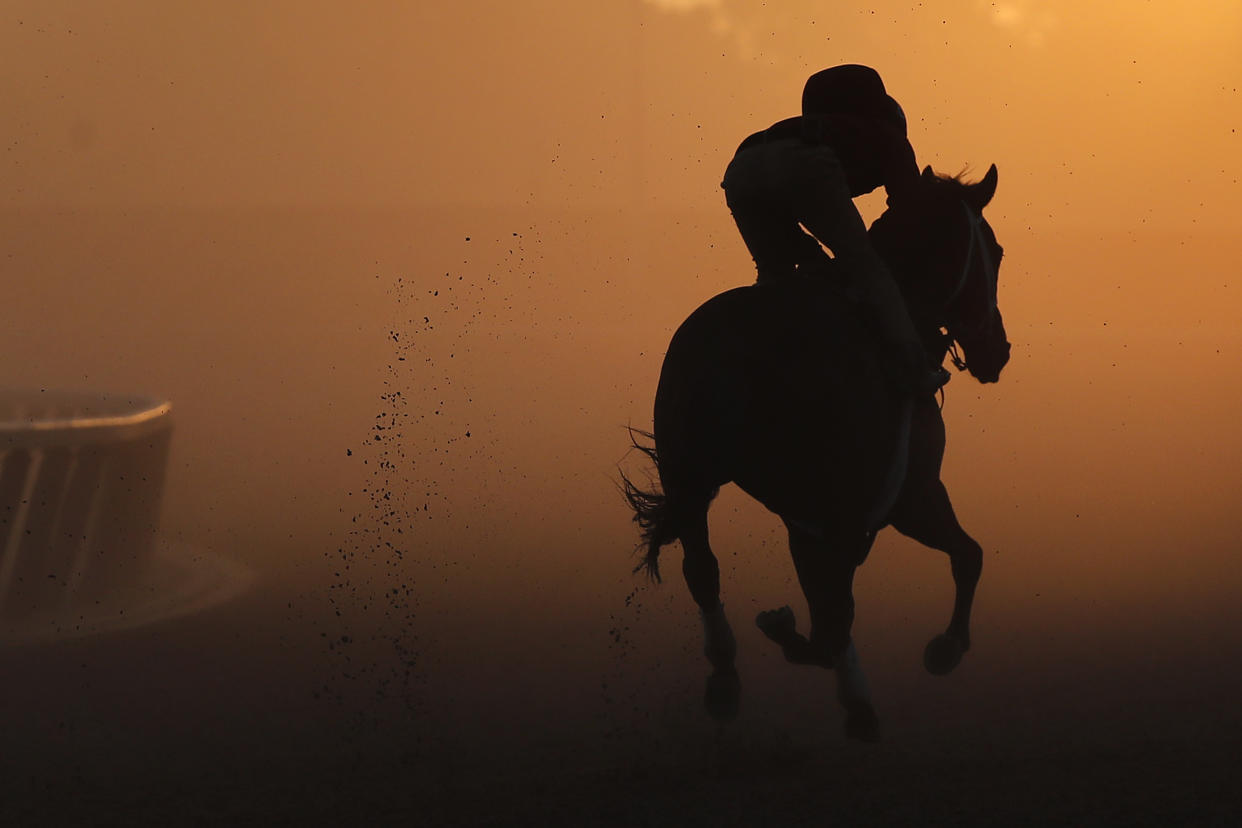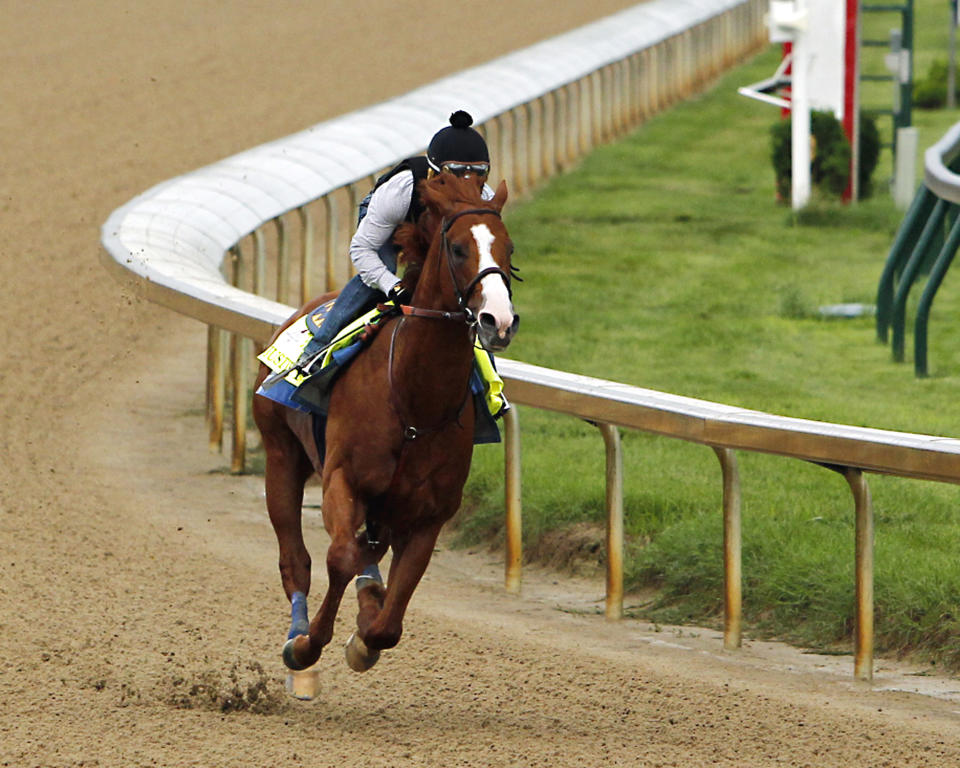Does the Triple Crown matter as much after American Pharoah?

Ninety-nine years ago, a horse named Sir Barton became the first winner of the Triple Crown. Except there was no such thing, at least in a formal sense.
On June 11, 1919, a horse described in the New York Racing Association media guide as “a cranky colt who disliked all humans” beat just two competitors in the Belmont Stakes. It was Sir Barton’s fourth win in a span of 32 days, with the first and second being the Kentucky Derby and Preakness Stakes. (The animal squeezed in the Withers Stakes between the Preakness and Belmont, a preposterous proposition today.)
The term “Triple Crown” wasn’t even in existence at the time. Nobody had bundled the three biggest American 3-year-old races into its own elite series.
Over the century that followed, the Triple Crown has become the ultimate in thoroughbred achievement, accomplished just 11 other times. The difficulty of the task has stamped those who won the triple as truly great colts, destined to be remembered for as long as horse races are run. They are the stuff of myth and lore.
Except maybe Justify, the 2018 Derby and Preakness winner who will attempt to complete the quest Saturday. He could be suffering from a reverse recency bias.
That’s because just when the Triple Crown appeared to be impossible for the modern thoroughbred, American Pharoah came along in 2015. That horse ended a 37-year span without a winner, a drought marked by torturous near-misses, a period that only added to the legend of those horses able to do it.
The cathartic roar that shook Belmont Park as Pharoah flowed down the stretch and under the wire that June day still reverberates, to a degree. Racing fans who were desperate to witness greatness can still hear it. Casual fans who were pulled in by the allure of a long-delayed triumph can still hear it.
And if we can all still hear it, a similar noise three years later isn’t quite the same music to the ears. In a been-there, done-that culture, a segment of America may well be over the Triple Crown quest, now that they’ve seen it with their own eyes and recorded it with their own cellphones.
“I would say American Pharoah winning it has taken a little of the buzz off,” said Mark Taylor, vice president of marketing and sales operations at Taylor Made Farm, one of the centerpieces of the thoroughbred breeding industry. “I think this time there’s definitely still a lot of hype and it’s still a great story, but it’s not a new story.”
Indeed, for years there was a school of thought that horse racing needed a Triple Crown less than it needed the chase of a Triple Crown. Once the “Can He Do It?” storyline disappeared, it took a section of audience with it.

Russell Westbrook knows the feeling. His chase of a season-long triple double average in points, rebounds and assists – the first player to do it since the 1960s – was a major story in the 2016-17 season. When he did it again in 2017-18, the number of interested parties plummeted.
The connections to Seattle Slew and Affirmed, Triple Crown winners in 1977 and ’78, could perhaps relate to Justify’s current predicament. They followed closely after the immortal Secretariat, who won the crown in 1973 and will never be topped as America’s most hallowed horse. But Slew was undefeated when he won the Crown and brilliantly fast, possessing a nearly jet-black coat – he was a flashy fan favorite. And Affirmed created his own unique place in history by narrowly defeating Alydar in all three races.
Also, that was the 1970s, when racing was a bigger deal.
“I don’t think we are dealing with quite the same situation,” Seattle Slew’s trainer, Billy Turner, said this week in comparing Justify with his horse. ” … The media and press coverage isn’t quite the same today that it was then.”
Bob Baffert, who trained American Pharoah and also trains Justify, will be just as thrilled if he saddles another Triple Crown winner Saturday. But he also understands some of the diminished anticipation this time around.
“Maybe because it’s been done,” he said. “I think a lot of people are not totally on board with this horse. He came around so quickly [after not racing as a 2-year-old]. Then everyone expected him to blow away the field in the Preakness, and he hangs on. But it’s just as exciting, and he has not slowed down.”
The Beyer Speed Figures say Justify did in fact slow down in the Preakness, dipping under 100 for the first time in his five-race career. But those figures, which are the go-to metric in horse racing, could well have been compromised due to a quagmire of a track at Pimlico Race Course that day. The Kentucky Derby also was run in the rain, but Churchill Downs is renowned for being able to handle a lot of water and still produce a quality racing surface – Pimlico, not so much.
Given the Preakness speed figure and the fact that Justify clung to the lead in the stretch instead of pulling away in dominant fashion, there are indeed some in the racing community who question whether the horse has true Triple Crown greatness in him. But it’s unlikely that the general public is scrutinizing races in the same fashion before deciding whether to buy into the hype.
Belmont attendance and TV ratings could better tell the tale of whether America has Triple Crown fatigue – but those also are fickle measuring sticks.
Derby TV ratings were down, but Preakness ratings were up. That could be a factor of competing interests, or lack thereof. The Derby was broadcast opposite a Boston-Philadelphia NBA playoff game, which undoubtedly hurt the audience, whereas the Preakness was run amid horrible weather on the East Coast, which likely kept a lot of people indoors and by their TVs.
What seems quite clear is that the hoped-for Pharoah Effect in the sport didn’t really happen. At least not in the mainstream. The first Triple Crown since 1978 did not transport horse racing back to the glory days, when it had a much more prominent place in the American sporting hierarchy.
There was no dramatic surge of $2 bettors showing up at tracks or betting online. According to Jockey Club stats on American wagering, there has been a modest year-over-year increase in national handle since Pharoah won the Triple Crown – up 0.6 percent in 2016, then up another 1.5 percent in ’17 to $10.9 billion nationwide. That still is nowhere near the high-water mark of $15.2 billion in 2003.
The breeding industry also is far removed from its halcyon days in term of number of horses sold and total dollars spent in the sales rings, having taken a huge hit in the 2008 recession and thereafter. But there are signs of renewed life in recent years, especially last year.
At the Keeneland sales in Lexington, Kentucky, annually where the highest rollers from around the world gather to bid on horseflesh, sales escalated $15 million from 2016 to ’17 while the number of horses sold decreased by more than 500. The average price per sale shot up $10,000, to nearly $91,000 per horse.
That buttresses assertions from Baffert and others that American Pharoah may have inspired owners at the highest echelon of the sport to chase their own Triple Crown dreams.
“You know what the impact was? We had a lot of new people get involved in buying horses,” Baffert said. “Everyone wants quality. I think it’s really boosted the business at the top level.”
Taylor cited the eager involvement of China Horse Club (a minority owner in Justify) plus the impact of pharmaceutical entrepreneur Bob Edwards and hedge fund mogul Sol Kumin (who also has a piece of Justify) as key new players in recent years.
“American Pharoah did give our business a boost,” Taylor said. “Sometimes it is hard to draw direct lines, but I do think we have an influx of new owners that are trying to play at the top end.”
There is, yet again, rain in the forecast for Saturday – Justify may well run this entire Triple Crown in slop. That’s a frustration to Baffert, who believes the true talent of his colt would shine on a fast surface, but he’d take another Triple Crown any way he can get it.
Last week, America’s foremost trainer paid a visit to American Pharoah at Ashford Stud in Versailles, Kentucky, where he is living the exceedingly good life of a pampered stallion. Aware of Pharoah’s unique standing as the only living Triple Crown winner, Baffert said he posed a question to his most accomplished horse that day.
“I asked him if it was OK if another horse [won the Triple Crown],” he said. “He didn’t seem to mind.”
More from Yahoo Sports:
• Warriors and Cavs united on one front: A Trump visit
• Convicted child molester presents dilemma for MLB
• Terez Paylor: As Trump wages war on NFL, players grow tired of ‘lies’
• Report: Trump ‘angry’ that Brady skipped 2017 visit
